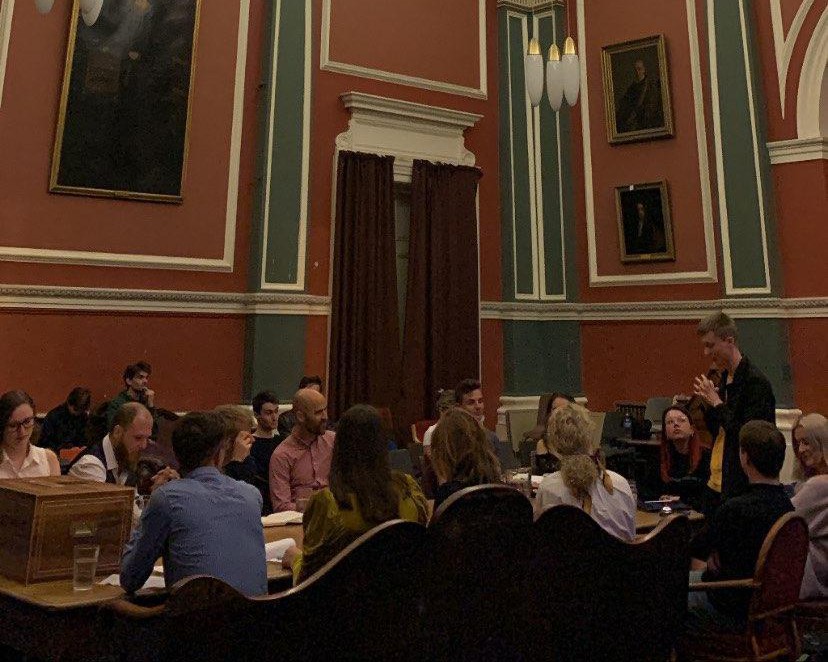On Wednesday night, eight bright, eager members of the Hist sat around the grand table of the GMB ready to debate the topic of online learning and whether it is a viable option for the future of education.
After a brief procession of traditional Historical Society formalities led by Auditor Sébastien Dunne Fulmer, TCDSU President Gabi Fullam initiated the debate as guest chair, and first proposition debater Constantine Iordanov took the stand. His central argument was that education is becoming commercialised and digitised daily with the rise of “big tech,” so why not embrace it? This rhetoric bolstered a lot of laughter among audience members as Iordanov almost implied that our society was simply doomed and that we should all accept defeat. Iordanov explained that our education system needs to be setting us up for our futures of sitting inside and staring at a computer screen. He made the argument that online learning does just this. Iordanov concluded his speech with the following line: “Welcome to the death of the universe and the birth of the metaverse.”
Woods outlined the three goals of education – material, skills, and networking – and how online learning undermines every one of them.
After Iordanov’s seven minutes were up and a loud wave of clapping had passed, first opposition speaker Mary Woods took Iordanov’s place. Woods outlined the three goals of education – material, skills, and networking – and how online learning undermines every one of them. Woods discussed the lack of socialising that comes with online learning and how damaging this can be to the learning process. She also argued that integrating online learning, even to the smallest extent, promotes laziness. Woods added that the virtual learning structure makes it possible for people to take the easy way out and sit in bed all day which inadvertently deteriorates one’s relationship with self as productivity levels drop. Finally, Woods completed her speech by asserting that schools like Trinity were never designed to be online and that mastering in-person learning is far more valuable than simply having an online option.
Following Woods’s time on the floor, second proposition speaker Daniela Williams got positioned at the podium and began her speech. Unlike Iordanov’s more radical approach to online learning, Williams suggested a more gradual shift in which schools begin implementing small changes to the learning system. She described online learning as a great short term solution for those who simply cannot learn equitably under conventional systems. To corroborate this claim, she discussed learning difficulties among those with disabilities and the ongoing housing crisis across cities like Dublin that have made attending in-person lectures a more impossible feat. In closing, Williams produced scholarly research that defends the idea that more pandemics are in our future. She argued that if a virtual learning system is not widely implemented, we are failing to acknowledge the inevitable recurrence of global pandemics that will likely plague our futures.
Once the applause had settled following Williams’s speech, opposition speaker Peter Maher took his place at the stand. In a more personal manner than speakers that had preceded him, Maher recalled his own experience with commuting to and from school every day and the multi-hour journey that he faced. While at first, it seemed that Maher planned on framing this experience in a negative light, he soon explained that this difficulty – while inconvenient – was essential to his college experience. According to Maher, : “the process of education must always remain challenging.” Maher added to this assertion by explaining that we live in a society that has made everything so easy. Apps like Tinder and JustEat, make once challenging feats, effortless. While such ease may be seen as positive he argued that the future of our education, if made virtual, would be another cop out, a way to lessen an integral part of growing up and developing as a person. The discomfort, the way in which this lecture goes against our desires to be lazy, is integral to our development:. “We are here to be challenged, we are here to be educated. If you want to learn something, use Wikipedia, but if you want to be part of something way bigger, college is essential.”
The following proposition speakers rebutted by explaining that holding classes online makes students directly responsible for their own time and workload management; it is on you to watch that lecture on time. It was further discussed that online classes facilitated more students’ entry into an elite college like Trinity: “Opening up a laptop is far easier than dismantling systematic inequalities associated with wealth”. However, the final two opposition speakers earned their side a victory in rejecting the motion. Tom Francis and Assistant Professor of Sociology Pablo Gracia made distinctive points about the ongoing mental health crisis affecting mostly young people today, and used the emotional and social aspect of having in person classes to sway those attending to vote in their favour.
As President of TCDSU, Fullam explained that education has had to evolve quickly and dramatically due to necessity, but this hasn’t always been done in a way that is beneficial to students.
The debate ended with an insightful conclusion by Fullam from the chair. She noted that each side raised valid and interesting points. As President of TCDSU, Fullam explained that education has had to evolve quickly and dramatically due to necessity, but this hasn’t always been done in a way that is beneficial to students. Instead, she suggests that we should all move towards Universal Design Learning (UDL). UDL is a practice, or rather a philosophy, applied towards education in a way that makes “education possible and fundamentally better for a wider range (of students) and empowers the learner”.
Regardless of the debate’s outcome, both attendees and debaters were left exhilarated after a long evening of stimulating conversation. The night concluded with a brief social hour in which the arguments of the night were discussed in a more thorough (and calmer) manner.






